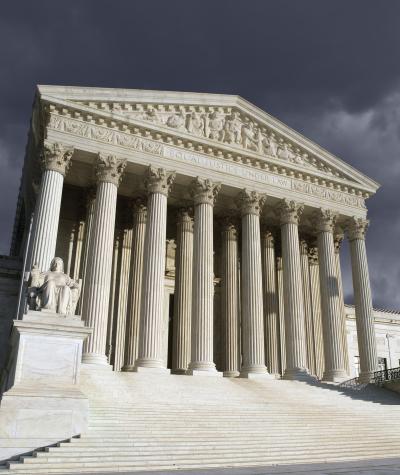The Judicial Conference of the United States will meet this week to consider a number of issues concerning the judicial branch, including its ongoing investigation into Justice Clarence Thomas for willfully omitting tens of thousands of dollars of gifts from wealthy GOP donor Harlan Crow from his financial disclosures.
This investigation has taken nearly a year and half, with the only results being frustratingly little information and repeated delays. Now, Campaign Legal Center and five of our allies who have spent years advocating for Supreme Court reform, are calling on the Judicial Conference to move forward and refer the Thomas investigation to the U.S. attorney general.
The goal and scope of our effort goes far beyond potential consequences for Justice Thomas. Americans’ trust in the Supreme Court is at an all-time low, and the Judicial Conference has not been able to prevent a troubling pattern of justices flouting ethical standards.
Another delay in the Thomas investigation or an outright dismissal threatens to confirm what many of us fear — the highest court in the land is not bound by the same law it upholds.
The Supreme Court’s problem with ethics
Our current Supreme Court ethics code rests on the presumption that justices who can occupy this esteemed seat, by virtue, are willing to hold themselves to a high ethical standard and therefore do not need the accountability of clear enforcement mechanisms.
For most Americans, this is a false characterization of the Supreme Court. Justices are just as susceptible to bending and breaking the rules for personal gain as all other government officials.
The story of Justice Thomas and his lavishly funded lifestyle — including yearly luxury vacations and frequent private jet setting funded by wealthy individuals with clear political agendas — certainly fits that narrative.
Having an easily circumvented (or ignored) ethics code doesn’t just allow justices to get away with fudging the numbers on financial filings — it reinforces a norm where they are free to make up the rules as they go.
We have seen, for decades, justices refusing to recuse themselves on cases they could be biased on, toe the line on partisan behavior and ignore public demand for enforcement.
Justices will continue to ignore the elephant in the courtroom and claim that their position on the highest court means they have a unique ability to self-govern, no matter what facts say otherwise.
The Judicial Conference has a history of failing to act
The Judicial Conference is one of the only bodies that can enforce ethics laws against Supreme Court justices, but it has a questionable track record when it comes to addressing the multiple ethics violations that have tarnished the Courts’ reputation.
When the case in question made headlines after ProPublica broke the news in April of 2023, ethics lawyers (like the team at CLC), former federal judges and the American people balked at what was clearly an example of ethics code violation.
Yet repeated calls for action and diminishing public opinion of the Court have not brought the Judicial Conference any closer to recommending the case to the U.S. attorney general.
Delayed action and ending investigations before they begin is common practice for the secretive body, which has repeatedly faced accusations of protecting rather than policing the judiciary.
It’s time to consider a new approach to enforcement
The accountability Americans are calling for cannot be expected to come from Justices themselves. Therefore, a clear and enforceable ethics code is the next logical step in building public trust in the Court.
Even certain justices have come out in support for establishing a dedicated outside body responsible for enforcement.
Reform is a clear pathway towards regaining voters’ favorability. According to POLITICO, 75% of voters support a binding ethics code for the Supreme Court, including 81% of Democrats, 72% of Republicans and 69% of independents.
Our organization agrees and joined several others last fall in a letter to Chief Justice John Roberts calling for new, enforceable rules.
Trust in the Supreme Court is more important than ever
Our country will be under a new administration in just a few short months. In moments of political transition, especially during an election that has proven to be one of the most unusual, litigated and divided cycles in recent memory, it is more critical than ever that Americans view the Supreme Court as it was originally intended to be: a stalwart champion of the law that can be trusted to rule on some of the most existential questions our country faces.
Restoring public trust will require new ideas on enforcement and better accountability methods. CLC will continue this fight; but in the meantime, we urge the Judicial Conference to do its job and address clear ethics violations.
Read CLC and our partner’s full letter to the Judicial Conference here.


